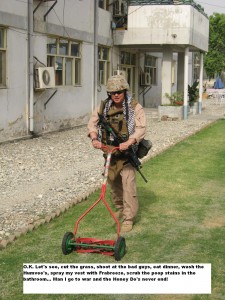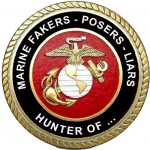Third post from Brooks
January 10th, 2008 Posted in The SandGram v1.0Dear Family and Friends:
Since my last update, Christmas and New Year’s Day has come and gone, as has Ramadan, or “The Break in the Fast” celebration, and Eid al Adha or “The Sacrificial Holiday”, where all work stops here, sheep are slaughtered, and families, wealthy or poor, gather for sumptuous meals. The tiny office I share with two other Marines has a small refrigerator stocked with baked goods from friends, family, and well wishers across America who we will probably never meet. In the past few weeks the flow of care packages has not ceased. From middle schools to church congregations, small and large boxes arrive almost daily, filled with beef jerky, granola, energy bars, shaving cream, athletic socks, and cards and letters. A British Royal Marine I work with commented that he is simply stunned by the volume of goods Americans send to their troops, for this sort of display of gratitude from countrymen is something entirely foreign to the deployed British troops in the south, who he says rarely receive much from the home front.
The generosity and largesse that is unique to America has also been manifested in the lives of many well to do and ordinary Iraqis in Anbar, where, for the past year, the Marines have allocated tens of millions of dollars to the provincial economy, working with sheiks and municipal government leaders to identify areas where our money can jump start reconstruction projects, repair schools, clean the water, and get school books and pencils to needy children. It is probably fair to say that Anbar has received over one hundred million dollars from the military, with over two thirds of that going to education, governance, justice, public safety, sewer and water, electricity, and trash collection.
While I was traveling through northern Fallujah two weeks ago, we passed through the Jolan District, the scene of some of the fiercest fighting between Marines and insurgents in 2004-2005 and still a very dangerous place up until about nine months ago. Our small convoy of Humvees stopped in the main market area and we were mobbed by a crowd of young boys, practicing their English, eyeing our gear, and asking us for candy. Children nearby is always a good sign, so we let our guard down a bit and joked with them. The market was full of sheep being herded toward the open square where they were purchased, then held down, their necks slit, and once dead, skinned and taken to the nearby butcher. A fruit and vegetable stand was full of fresh produce, everything from peppers to watermelons to cucumbers, much of it imported from Syria, but some of it locally grown. Nearby stood a new water tower, once nearly destroyed in the urban fighting, but now fully functional and freshly painted: American dollars, Iraqi labor.
Outside Fallujah, we drove through a verdant agricultural area called Azergiya, where children raced barefoot down dirt driveways to the main road, waved to us, and asked for soccer balls and candy. We had none; in fact we have stopped handing out gifts like candy to the children out of concern that we were raising unrealistic expectations and for their own safety along the road. I found it interesting that a few of these kids had become so jaded that they merely opened their mouths and pointed to their tongues, but most ran alongside our vehicles and smiled innocently. Someday soon, we’ll have to also reduce our handouts to the sheiks in Fallujah, who are unceasing and unabashed in their requests for American financial assistance. It seems we cannot encounter an Iraqi who does not ask us for something. We stopped at a local school, where we met the caretaker and toured the trash and sheep dung covered grounds. Our hope was that it would be suitable for a joint US-Iraqi medical team to set up and administer to the locals. Two of the insidious legacies of Baathist rule are the high illiteracy rate among Iraqis and the poor water quality, both of which affect children, moreso than adults. Our Iraqi interpreters handed out fist sized stuffed animals and pencils for school as gifts to the caretaker’s seven children. Down the road, we stopped to pay a visit to the local Iraqi Police colonel at his command post set up in the home once occupied by his brother, who was killed by the insurgents. The burned out and bullet riddled carcass of his brother’s white BMW was parked outside. The colonel had fought the Iranians in the Iraq-Iran War many years ago and was a seasoned military man. Before we departed, a convoy from our Combat Engineers arrived with plywood guard shacks, purchased for the Iraqi Police so that they can stay sheltered while standing watch on cold winter nights when the mercury dips below freezing.
As I near the end of my third month in Iraq, I often reflect on a comment made by an Iraqi Police major who spoke English quite well. He and I were seated next to one another at a town council meeting in Fallujah. During the weekly meeting, where local leaders submit their constituents’ bids for American funded contracts and haggle over pricing with the Marines, the discussion turned to politics and the plight of the Sunnis in Anbar, who are now out of power in Baghdad and none too pleased about it. The police major told the sheiks and the senior imam (religious leader) that the only way to change their political circumstances was to vote in the next election and tell all their people to vote. He mentioned all Iraqis voting, but he really meant all Anbar Iraqis, specifically the Sunnis. Then he turned to me and said “You know, we must only talk about the future, (for) if we keep talking about the past, everyone here” and he swept his arm around the room, “(would have been) detained.”
Semper Fidelis,
Brooks D.Tucker
Major, USMCR
Tags: The SandGram v1.0





